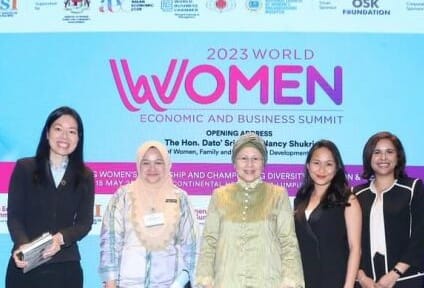At the 2023 World Women Economic & Business Summit in Kuala Lumpur, Professor Geoffrey Williams shared his analysis of the average salaries of men and women in Malaysia. His argument centred on the notion that the average salaries of men and women are nearly identical once adjusted for hours worked (e.g., hourly wage for males is RM18.6 while the hourly wage for females is RM18.7). Although this viewpoint provides a valuable overview, a more detailed examination of data by occupational categories reveals a contrasting depiction. There exists a notable disparity in hourly wages between males and females in several occupational fields, such as managers, professionals, and clerical support workers, among others, which cannot be attributed to disparities in working hours. The observed discrepancy indicates the presence of a gender-based wage disadvantage within some occupational domains, even when accounting for differences in labour hours.
Table 1: Gender Pay Gap by Occupation in Malaysia 2021
Occupation Gender Monthly Wage Paid hours (month) Hourly Wage Difference (%) Managers Male 6848 178.4 38.4 Female 5299 174.4 30.4 -20.8 Professionals Male 6338 168.0 37.7 Female 5248 162.0 32.4 -14.1 Technicians and associate
professionalsMale 3537 177.6 19.9 Female 3383 174.8 19.4 -2.8 Clerical support workers Male 2739 173.6 15.8 Female 2232 173.6 12.9 -18.5 Service and sales workers Male 2135 179.6 11.9 Female 1736 173.6 10.0 -15.9 Skilled agricultural, forestry, livestock and fishery workers Male 1868 148.8 12.6 Female 1732 138.8 12.5 -0.6 Craft and related trades workers Male 2001 174.8 11.4 Female 1915 147.2 13.0 13.6 Plant and machine operators and assemblers Male 2099 185.2 11.3 Female 1753 182.4 9.6 -15.2 Elementary occupations Male 1779 178.0 10.0 Female 1665 192.8 8.6 -13.6
Sources:
Salaries and Wages Survey Report Malaysia 2021 (Department of Statistics Malaysia); Mean hours worked by occupation and sex, Labour force Survey Report 2021 (Department of Statistics Malaysia); Data refer to citizens. Occupation is classified according to the Malaysia Standard Classification of Occupation (MASCO) 2013; Data refer to citizen; Occupation is classified according to the Malaysia Standard Classification of Occupation (MASCO) 2013.
Table 1 presents the varied occupational groups in Malaysia and their corresponding levels of gender pay gap. The data reveals a nuanced scenario in which gender-based pay disparities exhibit variations across different types of occupations. The gender gap is particularly evident in jobs that provide greater remuneration, such as managerial and professional roles, where males tend to get higher pay compared to females. A pay gap of 20.8% has been observed between male and female managers, with males earning an hourly rate of RM38.40 and females earning RM30.40. In the realm of professional occupations, there is a significant pay discrepancy of 14.1% with male professionals getting an average hourly rate of RM37.70, but their female counterparts receive RM32.40. Within the domain of craft and related trade occupations, a discernible pattern has emerged whereby women exhibit a 13.6% higher hourly page compared to their male counterparts. Nevertheless, in the broader context, the data highlights a notable gender pay disparity across many occupations, particularly at the extremes of the earnings spectrum.
This pattern may signify structural barriers within higher-paying industries, hindering women from achieving equal pay. Disparities in these lucrative positions could stem from several causes such as limited access to opportunities and differences in salary negotiations. Various factors, including social, cultural, and economic dynamics, may also affect work conditions. The evidence stresses the need for tailored interventions and policies, considering these complexities instead of a one-size-fits-all approach. A rigorous analysis of occupational data is essential to thoroughly understand the gender wage disparity in Malaysia. The intricacy of this problem is further complicated by factors like educational requirements, job responsibilities, and institutional biases. To develop effective strategies to address and ultimately eradicate the gender pay gap, it is essential to investigate these factors and avoid conclusions based solely on aggregate data without considering occupational nuances.
Over the past decade, Malaysia has seen remarkable progress toward gender equality in the corporate landscape. Gender diversity policies have been instrumental in increasing female engagement in the workforce, with 30% of leadership positions now held by women. According to the Department of Statistics Malaysia, as of February 2023, the participation of females in the labour force is 56.0%, compared to males at 82.9%. Despite this, more females (56.9%) have achieved higher education compared to males (43.1%) in 2020. These statistics underscore the need to further tap into the highly educated female talent pool.
Our research, conducted on 279 publicly listed companies in Malaysia between 2013 and 2022, examines the impact of female representation at decision-making levels on corporate performance. Specifically, we found that for every 10-percentage point increase in the representation of women on boards and female executives, there was a significant improvement of 1.4% and 1.2% in return on investment, respectively. We also investigated the role of fair remuneration in strengthening the connection between gender diversity and corporate success. A significant limitation of our study, however, is that it lacks detailed gender-specific pay data, requiring us to rely on the ‘compensating and benefit’ rating provided by CSRHub (2022). This rating defines fair remuneration as encompassing just and equal pay and financial benefits, contributing to enhanced workforce loyalty and productivity. Our empirical results showed that fair remuneration, especially for women on boards, led to an even more substantial increase in return on investment, rising by 1.6% for every 10-percentage point increase in female representation. This finding emphasizes that fair compensation extends beyond ethical considerations, serving as an essential business strategy.
The journey towards gender equality in Malaysia’s corporate environment is marked by promising progress. However, the findings suggest that gender diversity policies, coupled with fair remuneration, can lead to even more substantial economic benefits. Increasing female representation is not only about fulfilling quotas; it demands an alignment with fair pay principles to bridge gender pay gaps and foster workplace collaboration. This research serves as a critical reminder that gender diversity is not merely a social obligation; it is a sound business strategy that can lead to tangible economic gains.
The efforts made by Malaysian corporations mark an important step toward a more equitable future. The focus on not only increasing female representation but also transparently disclosing gender pay gaps will help build a more effective and harmonious working environment. This strategy offers a valuable lesson for corporations around the world, proving that thoughtful gender diversity can be a powerful catalyst for corporate success.
Women’s Equality Day celebrated annually every August 26 since its inception 50 years ago in the United States is a firm reminder of women’s continuous efforts to achieve full equality. The support for gender equality is far from over as the gender pay gap still impacts women’s economic empowerment. Voluntary organisations such as the 30% Club influence change through gender-balanced boards to boost diversity and inclusion. Malaysia is also making significant progress with the Malaysian Code of Corporate Governance revised in April 2021 to include greater participation of women in decision-making positions beyond board positions. This positive acknowledgment not only recognises women’s vital role in senior management positions but the importance of diversity, equity, and inclusion in the workplace.
by Professor Grace Lee Hooi Yean, Head of the Department of Economics, School of Business, Monash University Malaysia., Elise Looi Kah Yee, PhD candidate at the School of Business, Monash University Malaysia. And Dr Sharon Koh Geok May, Director of Graduate Research Programs and Senior Lecturer, School of Business, Monash University Malaysia









